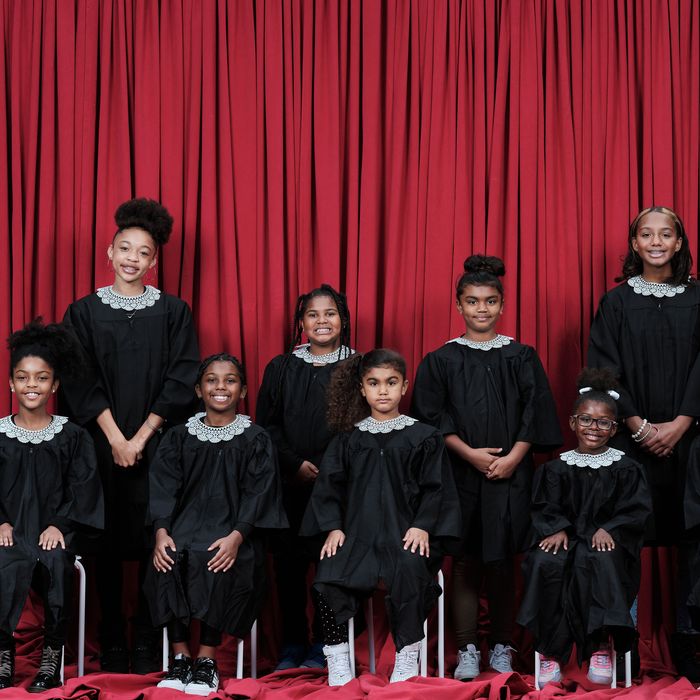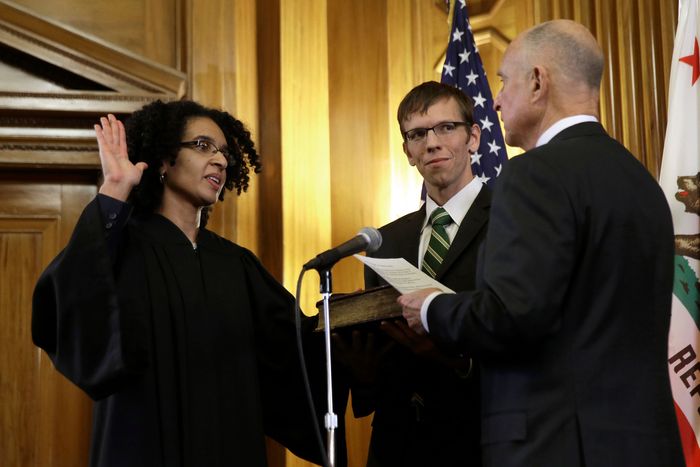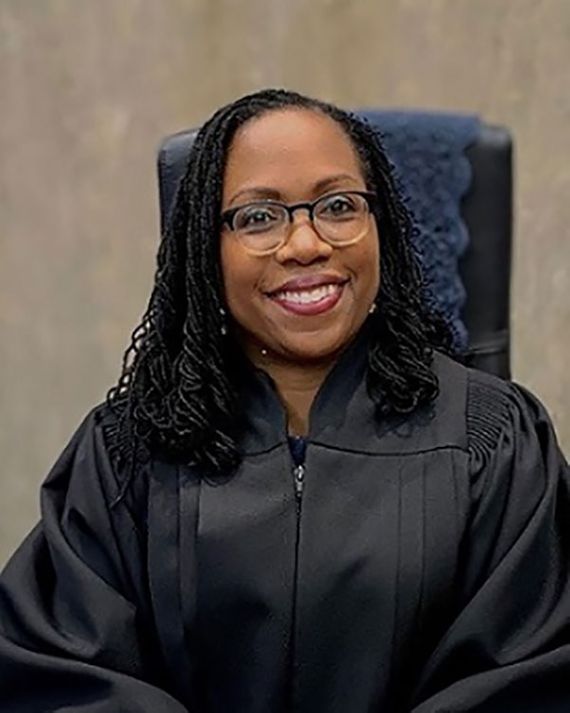
Joe Biden’s campaign mainly promised restoration. There was, however, one way that Biden said he would break with the past: In February, he declared that he would nominate the first Black woman to the Supreme Court. The pledge, half-buried in the chaos of this year, suggested that this old white man — the one who needed several tries to apologize to Anita Hill —would be the one to make history. And unlike the Cabinet positions currently subject to political jockeying, this one would be for life.
But whether Biden will be able to actually do it will likely be decided by the Georgia Senate runoffs in January. If Democrats gain control of the Senate, the only question will be when a vacancy will open up. And if they don’t, the fate of any nominee will be decided by how much Mitch McConnell thinks he can get away with.
“The lesson that we learned from the recent Supreme Court nominations is that Mitch McConnell’s rule around judges is power,” said National Women’s Law Center president Fatima Goss Graves. “That is the only operating theory. And that is terrible for the country.”
The groundwork is already being laid for the battle ahead. The Wall Street Journal reported recently that Biden advisers plan to have a Supreme Court nominee shortlist by Inauguration Day. When I asked one person whose name has appeared on shortlists if she believed herself to be under consideration, she laughed and said, “Every Black woman under the age of 50 is under consideration.”
Two names, though, have come up most often in conversations with legal insiders: California State Supreme Court Justice Leondra Kruger and federal district court judge Ketanji Brown Jackson, a former clerk to the oldest current Supreme Court justice, Stephen Breyer. Both have impeccable credentials — and, crucial to a lifetime appointment, are younger.
Biden’s designated chief of staff, Ron Klain, is as experienced in Supreme Court politics as anyone. A former Supreme Court clerk to Justice Byron White, Klain led the nomination of White’s successor, Ruth Bader Ginsburg, inside the Clinton White House. As chief of staff to then-Vice-President Biden, Klain was “extremely central” to Obama’s judicial nominations in a manner unusual for his role. “It spoke to both his interest and expertise,” says a lawyer in the White House Counsel’s office who worked with him then. But some progressive leaders I spoke to privately wonder whether Biden, who still likes to talk about how his personal relationships with senators will overcome obstruction, is prepared for this unabashedly partisan era of judicial politics.
The upcoming pick for solicitor general, the Senate-confirmed lawyer who argues the federal government’s case before the justices, could smooth the path. The first Black solicitor general, Thurgood Marshall, became the first Black justice; the first woman to hold the position, Elena Kagan, now sits on the Court. Even now, very few women appear before the justices, and even fewer aren’t white. Kruger, who argued a dozen Supreme Court cases while holding senior roles at the solicitor general’s office, is being floated for the role.


Kruger got a boost this month when a coalition of progressive groups, including Demand Justice and Indivisible, endorsed her and several other Black women in a letter to Biden urging him to pick a Black woman for solicitor general. Though she’s been described as a moderate, Kruger is on their list of suggestions, along with Rutgers’ Elise Boddie, Lawyers’ Committee for Civil Rights Under Law president Kristen Clarke, NYU law professor Melissa Murray, the Innocence Project’s Christina Swarns, and Sherrilyn Ifill and Janai Nelson of the NAACP Legal Defense Fund.
The organizing underway isn’t just directed at the transition. “I was ecstatic about Joe Biden’s promise, but what frustrated me is that it didn’t get much attention,” Kim Tignor, an adviser to Demand Justice and a co-founder of its She Will Rise initiative, told me. “It wasn’t catching fire the way that I thought that it needed to.”
She recalls Obama’s nomination of Loretta Lynch to attorney general — “one of the most difficult and delayed confirmation processes I’ve ever witnessed.” When Lynch finally got her shot, Tignor says, “What moved me were the Black women who activated around the hearing.” Members of Lynch’s sorority, Delta Sigma Theta, flooded the hearing room dressed in their signature crimson and cream. “It just signaled how important it is to broaden the network of people who are working on these vacancies,” said Tignor.
She Will Rise, which came together in September, has a stylishly color-blocked site, a catchy URL (sistascotus.org), and a roster of influential people, some of whom aren’t the usual suspects for court battles, like actress Audra McDonald and Well-Read Black Girl co-founder and author Glory Edim.
“When you think about the African American community and communities of color, we are fighting for our lives,” says Tignor. “Part of it is about capacity. There’s a barrier to understanding just how close the Supreme Court is to our lives.” She cites the protests around the deaths of George Floyd and Breonna Taylor at the hands of police. “It’s understandable that the Supreme Court just feels like a long game,” Tignor says. “One of the things I wanted to do with She Will Rise is to make these connections with Black communities. You want to have a conversation about police reform? Let’s talk about the doctrine of qualified immunity.”
In getting out the vote, Democratic organizers have tried to focus less on the political tug of war than the kinds of issues the Senate and the courts take up. “It can’t just be about, We want to control the Senate,” Cliff Albright, co-founder of Black Voters Matter, told the Guardian. “We have got to say we’ve got to control the Senate because health care is on the line, because the Voting Rights Act is on the line, because racial justice and whether or not police officers and district attorneys are able to continue to get qualified immunity when they kill Black folks, that’s on the line.”
Should Democratic candidates Jon Ossoff and Raphael Warnock both prevail in Georgia, the pressure would be on Breyer to step aside. “I would think that Breyer would look around, and see what happened to his friend Justice Ginsburg when she did not step down,” said University of Michigan law professor Leah Litman, “and would view that as a cautionary tale.”
The 82-year-old has made a point of staying visible, even popping into a 70-minute Zoom appearance at a private school from his home in Cambridge, Massachusetts, and people who saw him right before the pandemic said he seemed spry and alert. That makes some liberals cautiously optimistic that if Democrats don’t take the Senate, Breyer could wait it out in the hopes Democrats would prevail in the midterms. But if a vacancy opens up on McConnell’s watch, the hope is that a historic choice would put unique pressure on him. “I think that a barrier-breaking nomination of a Black woman to the Supreme Court will be the sort of thing that galvanizes both people who typically focus on things like Supreme Court nominations, but also lots of people who do not,” says Graves.
Implicit in all this preparation is what didn’t happen when Barack Obama made his final and third Supreme Court nomination. “There were people who were disappointed that President Obama did not have the nomination of a Black woman on his agenda,” says Michele Goodwin, a law professor at the University of California. “There were times that no Black women were even interviewed.”
The planned retirements of Justices David Souter and John Paul Stevens had given Obama the chance to nominate Sonia Sotomayor as the first Latina justice and Kagan early in his first term. Both were confirmed by a Democratic-controlled Senate. But when Antonin Scalia unexpectedly died in February 2016, Obama had a choice about how to approach the intractability of McConnell. I remember calling around at the time to try to suss around who Obama would choose. “I’ll tell you who it won’t be,” said the head of a progressive legal advocacy group. “Merrick Garland. Too old, too white, too moderate.”
Obama had other ideas. Having reportedly interviewed Ketanji Brown Jackson, among others, he chose D.C. Circuit Judge Garland, 60, on the apparent theory that it would box in Republicans who had said nice things about him in the past, or perhaps that their hypocrisy would be punished by voters. “Merrick Garland was absolutely qualified but no one was going to go in the streets and protest,” says Goodwin.
But what if the nominee had been a Black woman? “I think Mitch McConnell would have been hard-pressed to stand up there and say he was not going to let a Black woman onto the Supreme Court,” says Marcela Howell, president of In Our Own Voice: National Black Women’s Reproductive Justice Agenda.
Of course, McConnell had been only too happy to block legions of Obama judicial nominees, including several Black women who could have been poised to ascend even further. In 2016, Obama nominated Indiana attorney Myra Selby to the Seventh Circuit Court of Appeals. Senate Republicans never even gave Selby a hearing, instead holding the seat for Trump’s pick: Amy Coney Barrett.
And in the end, McConnell paid no electoral price for holding Scalia’s seat open for Trump to fill; probably the opposite. Exit polls showed Republicans were far more motivated by judicial nominations than Democrats, a perennial frustration for legally minded Democrats that was made more acute by the chance to actually flip a seat, and Ginsburg’s age and cancer diagnoses. Trump triumphantly replaced Scalia with Neil Gorsuch, a former clerk to Anthony Kennedy, who obligingly made way for Trump to name another of his former clerks, Brett Kavanaugh. No wonder that in September, when Ginsburg died, McConnell saw no political reason to heed her stated wish that the next president choose her successor. Indeed, he has yet to face any consequence; Republican Senate candidates did well enough in this past election that McConnell has a more than decent shot at remaining in power.
The joint legacy of Trump and McConnell of rapid judicial appointments — including seats McConnell purposefully refused to fill under Obama — is distinguished not only by its dedication but also its whiteness. He nominated only two Black women to the federal bench, and none were to the powerful appeals courts that sit one rung below the Supreme Court. There are only four Black female appeals courts judges in the entire country.
“Black women judges came to the judicial table much later than Black men (by more than 80 years) and also much later than white women (by almost 60 years),” noted D.C. judge Anna Blackburne-Rigsby. In 1939, Jane Matilda Bolin became the first Black woman judge in the United States when she was named to the New York City Domestic Relations Court. “I am always impatient with those who say ‘You women have come a long way,’” Bolin said. “Since I am no gradualist, I think to myself that 150 years is too long a time to come a ‘long way’ in that those gains we have made were never graciously and generously granted. We have had to fight every inch of the way—in the face of sometimes insufferable humiliations.”
Constance Baker Motley would likely agree. Told by Thurgood Marshall that he “admired Black women who had the courage to enter the legal profession,” she spent nearly two decades at the NAACP Legal Defense Fund arguing civil-rights cases. In 1966, Lyndon Johnson nominated Motley for the powerful and prestigious Second Circuit Court of Appeals. “The opposition was great because I was a woman, I can only guess, since Thurgood had been there and he was Black too,” Motley later reflected. Johnson withdrew her name and nominated her to the district court instead, where she became the first Black female federal judge.
Johnson had already persuaded Marshall to leave the Second Circuit to serve as his solicitor general, and he had bigger plans for him still — the first Black justice. “Johnson needed a vacancy to put Thurgood Marshall on the court,” aide Joseph Califano told Wil Haygood for his book Showdown: Thurgood Marshall and the Supreme Court Nomination that Changed America, but no one was poised to retire. So in the summer of 1967, Johnson essentially pushed Justice Tom Clark off the bench by promoting his son to attorney general, creating a conflict of interest that would lead father to sacrifice for son and retire. Clark and his wife were sent on a goodwill trip around the world to soften the blow.
By last summer, South Carolina kingmaker, Representative Jim Clyburn, was effectively using Biden’s pledge to give the candidate runway on his vice-presidential pick. “I long for an African American woman to sit on the United States Supreme Court,” Clyburn told PBS, adding, “The VP is good on style, but, on substance, give me an African American woman on the Supreme Court. That’s where we determine how our democracy will be preserved.”
That Biden went ahead and picked Kamala Harris anyway meant something, says Melissa Murray. “That it wasn’t an either or, that it could be a both and,” she says. “To the extent that women of color and Black women in particular supported this ticket, it was on the strength of what they saw as a commitment to lift up a group that has historically been overlooked.”
What would it mean to have a Black woman represented inside the building where, for decades upon decades, white men refused to recognize their humanity? “Supreme Court justices work very hard to be impartial, but they are human,” says Angela Onwuachi-Willig, dean of the Boston University School of Law, and herself a possible contender for the bench. A more diverse Court, she said, could push a justice “to take any previously ignored or unseen realities into account as he thinks about the case.”
Murray also believes it could make a substantive difference to have another woman of color in the room. In a forthcoming paper in the Harvard Law Review, she reads the tea leaves of what could be Clarence Thomas’s approach to overruling Roe v. Wade. In 2019, Thomas wrote a long concurring opinion to a procedural motion on an Indiana law that banned abortion on the basis of race, sex, or diagnosis of a disability. Thomas’s casts proponents of abortion rights as the real racists — for his own strategic reasons. “Under principles of stare decisis, a past decision, like Roe v. Wade, cannot be overruled simply because a majority of the current Court disagrees with it,” Murray writes in her paper. “Instead, a ‘special justification’ is required. Justice Thomas’s association of abortion with eugenics begins to construct the case that racial injustice is the ‘special justification’ that warrants overruling Roe.”
With the addition of Barrett to the Court, Murray observed to me, not only is the median justice now far further to the right, Thomas may have an ally in a female conservative justice who opposes abortion and is parenting a child with special needs and two adopted Black children.
In the near term, Biden’s pick would likely be in a position to only, on the biggest cases, offer her dissents — not any judge’s first choice. Still, it’s a long way from the era in which Pauli Murray, a queer Black attorney and intellectual influence on both Marshall and Ginsburg, cheekily wrote to Richard Nixon suggesting he nominate her to the Court, a full decade before Sandra Day O’Connor became the first woman to join it.
She introduced herself as “a Constitutional lawyer whose specialty is human rights” with a “family background [that] numbers as high as seven generations of loyal citizens to the United States.” Of her letter, Murray concluded, “it does no harm to amuse your administrative and secretarial staff as it passes up and down the line on its way to the waste basket.”
This story has been updated to reflect that while Leondra Kruger is in her mid-forties, Ketanji Brown Jackson is 50-years-old.






























